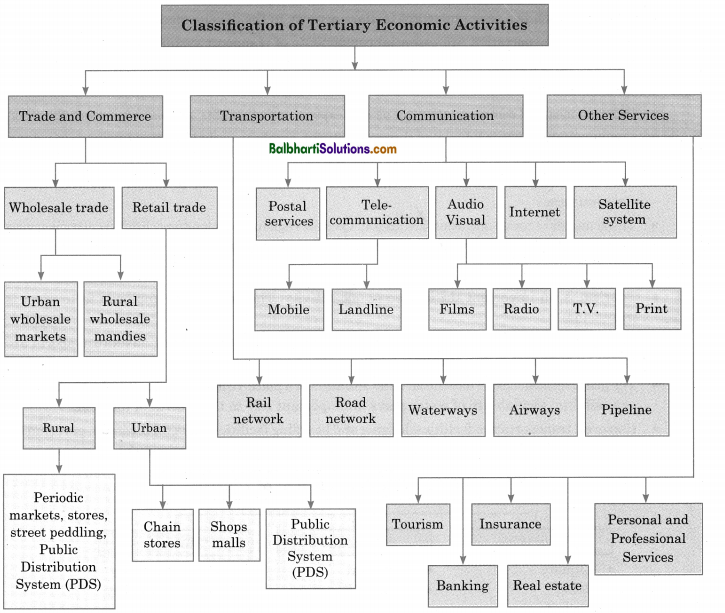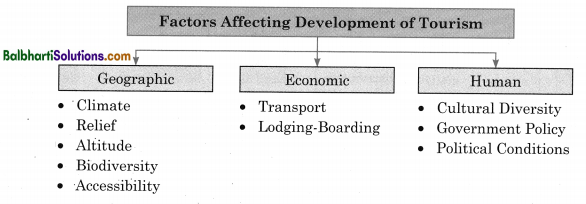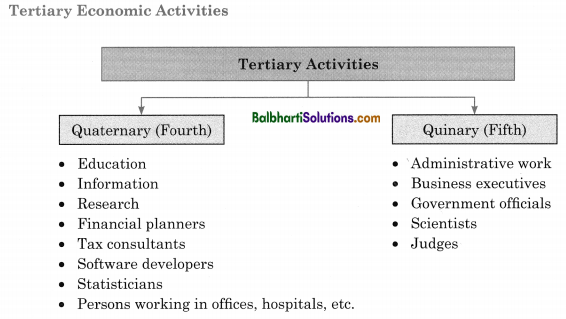By going through these Maharashtra State Board Class 12 Geography Notes Chapter 6 Tertiary Economic Activities students can recall all the concepts quickly.
Maharashtra State Board Class 12 Geography Notes Chapter 6 Tertiary Economic Activities
→ Natural resources are obtained by primary activities; secondary activities are dependent on products obtained from primary activities. Activities that act as links between primary and secondary are known as tertiary activities.
→ Tertiary activities are mainly service-providing activities. Therefore, it is called the service sector.
→ Buying and selling of goods, transport, and communication, loading and unloading, credit facilities, marketing, import-export, etc., are tertiary activities.
→ The distribution of service activities is dependent on the number of geographical factors like climate, topography, nearness to the sea, or continental location, which affects tertiary activities.
![]()

Trade and Commerce
→ Trade refers to the voluntary exchange of goods and services, where two or more parties are involved.
→ Bilateral or multilateral trades are major types of international trade. International trade takes place because of specialisation in production and differences in human resources.
→ International trade takes place only if it is mutually beneficial to trading partners (countries) and when it is a comparative advantage for both.
→ There are various geographical factors that affect trade. These are, differences in natural resources, climate, population factors, culture, economic cost and specialisation.
![]()
Transportation
→ Transportation is a service or facility through which passengers, freight and industrial products are carried from one place to another.
→ Transportation is a very important tertiary activity in the development of trade.
→ Means of transportation are essential components of transport systems wherein, each mode has its own requirements and features.
Communication
→ Different means of communication are used to express one’s thoughts and making it reach the other.
→ Communication is being depicted through pictures, symbols, verbal communication using signs, body language, postures, etc.
→ This is the era of information. Therefore, telephones, mobiles, internet, etc., are used to communicate.
→ These means of communication are largely used for regional development. Each country is trying to stay updated with information. Hence, technology in communication has increased manifold.
![]()
Other services
→ Tourism is an important tertiary economic activity. The population employed in tourism is increasing.
→ The climate, natural beauty of the region, availability of land and sea adventure sports are major contributors to the country’s GDP.
→ The geographical factors like the site and situation of a place, climate, relief, altitude, biodiversity, accessibility, availability of water plays an important role in the growth of tourism.
→ However, transportation facilities, lodging and boarding facilities, cultural diversity, government policies and political conditions are human factors affecting the development of tourism.


→ Considering tertiary economic activities, the services included in this sector are varied in nature. Therefore, these are categorized into quaternary (fourth) and quinary (fifth) activities.
→ Quaternary activities refer to think, research, and develop ideas whereas quinary activities involve work related to administrative character.
→ The difference between the two types is that the people involved in quinary activities are involved in the highest level of decision-making or policy-making.